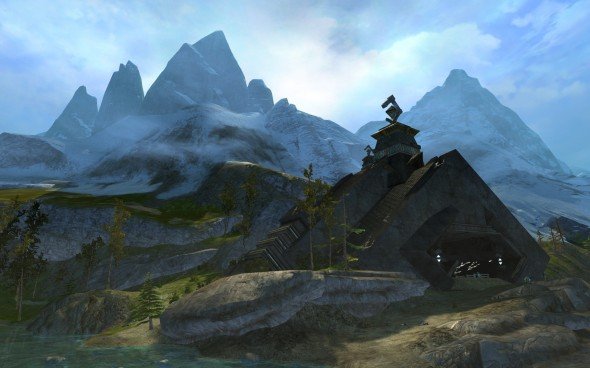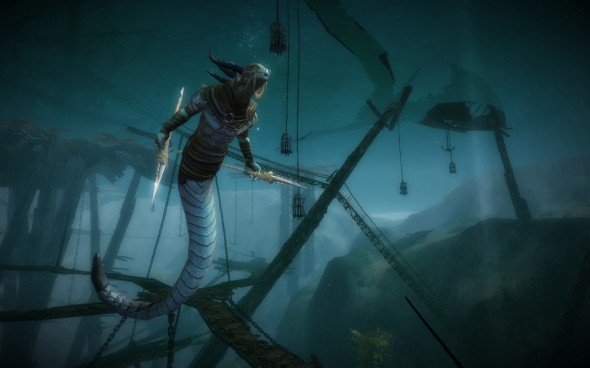Guild Wars 2 preview

We cooperated wordlessly, matching the capabilities of our characters to the present need without any planning or leadership. When the behemoth fell, a cheer went up. It dropped a glimmering treasure chest, from which everyone received a boon of item upgrades and generalpurpose loot. My gold-ranked contribution to the fight earned me half a level and filled me with genuine pride. What was remarkable about this encounter is that it provided toptier thrills with none of the set-up, none of the stress. This is exactly what ArenaNet are aiming for, Eric Flannum says. “One of the things that we really wanted to avoid was this feeling that the game doesn't really start until max level.”
What was remarkable about my time with GW2 as a whole is that situations like this one – impromptu mass cooperation, with a real sense of a collective experience – came about several times. I have questions about how events will operate when zones are either over or under-populated, but if nothing else my time proves one thing: the system works.
As with any other modern MMO, comparisons with World of Warcraft are inevitable. But in this case, not because Blizzard laid the groundwork for all its best ideas. Instead, GW2 is worth comparing to WoW because both games attempt to answer the same question: how do you get the largest amount of people to go on the largest possible adventure? Or more specifically: how do you do EverQuest without the nonsense?
World of Warcraft was revolutionary because it moderated EverQuest's punishing excesses. Instancing removed the need to queue for monsters in dungeons; mob 'tagging' gave ownership of a kill to the first player to land a hit, reducing the potential for kill-stealing. GW2's event system and emphasis on casual co-op are solutions to these same problems. Guild Wars 2 feels less like a successor to WoW and more like a parallel evolution from a common ancestor. It's an exciting new direction for the genre.

It's not, however, without issues. GW2's structure creates a sense of society that WoW – with its emphasis on grouping and private adventure – lacks. Conversely, not needing to find players with particular skill-sets means that in my weekend with the game I hardly spoke to anyone, and made no lasting relationships. The circumstances will have played a role in this, but there was none of the development of trust and respect that goes with knowing, for example, that someone is a great healer. It will be great if players get to become friends without being forced, but it would be nice to see some more robust social incentives on release.
Whether or not GW2 is the saviour some want it to be will be down to the individual. Its big ideas are subtle enough to pass by anyone who isn't attuned to the way MMOs usually operate, yet substantial enough to unsettle players invested in the status quo. It's player-driven both in the sense that its users determine the state of its content, but also in that it doesn't offer the satisfaction of 'finishing' an area before moving on to the next. It's constantly in motion, and as such you're asked to be far more proactive in seeking out your fun.
What's exciting about Guild Wars 2 is that it returns the emphasis of the MMO to having fun on your own terms. Even if the range of events you may encounter is fixed, the array of variables and the possibility of encountering those events with any number of other people creates a huge matrix of potential experiences.
Keep up to date with the most important stories and the best deals, as picked by the PC Gamer team.
The complexity of ArenaNet's design has resulted in a game that's deceptively simple to play, and one that returns the promise of the MMO to a straightforward question: would you like to go on an adventure?
Joining in 2011, Chris made his start with PC Gamer turning beautiful trees into magazines, first as a writer and later as deputy editor. Once PCG's reluctant MMO champion , his discovery of Dota 2 in 2012 led him to much darker, stranger places. In 2015, Chris became the editor of PC Gamer Pro, overseeing our online coverage of competitive gaming and esports. He left in 2017, and can be now found making games and recording the Crate & Crowbar podcast.


